“Buckle your seatbelt, Dorothy, ’cause Kansas is going bye-bye”, Cypher tells Neo in “The Matrix” movie. Not everyone gets the privilege to swallow the red pill and experience the true reality. But a British family of three chose to learn the truth over blindly following the pleasure call and embarked on a less convenient, slow travel journey – a no-fly trip to Australia.
Shannon Coggins (57), Theo Simon (65), and their daughter Rosa (19) left their cozy wooden home in Somerset, UK, back in August 2023. The trio’s destination was Wyoming, Australia, where Shannon’s sister Ellie Richmond planned to get married in December. The wedding venue in New South Wales was 15 thousand miles away from British Wales, a place so far that a simple Google Maps search spits the result “Can’t seem to find a way there”. Even the Travelmath trip calculator declares the distance as “complicated”, subtly suggesting: “You might even have to swim. May we suggest you fly instead?”
Slow travel pioneers
Indeed, to attend a wedding on the other side of the planet, most people would just take a bus to Bristol and hop on a plane to Sydney, a day’s journey away. But a family that, back in 2002, decided not to fly, knew there was only one acceptable answer – the slow travel adventure to Australia.
On her Buckle Up Dorothy blog, Shannon Coggins compared the slow trip to Australia with giving birth, a mixture of love and pain
The art student Rosa took a gap year, while her parents, the factory worker Theo and the school officer Shannon, both musicians in the folk band Seize the Day, known for their environmental campaigns, pulled brakes on their lives so they could minimize the carbon footprint on their four-months long trip Down Under.
But the Yellow Brick Road abruptly stopped in East Timor. To reach Oz, the no-fly family’s journey via buses, trains, and boats had to be polluted with a plane crossing to Australia after all. Was it a defeat?
On her Buckle Up Dorothy blog, Shannon compared the slow trip with giving birth, a mixture of love and pain. We got to talk about their delivery in Australia, just before the return trip to the UK, because, after all, there’s no place like home.
Unlike Dorothy, Shannon, Theo, and Rosa won’t be able to just click their ruby shoe heels, or wait for the next tornado. The slow-travel family will embark on another grand journey to make their one small step for man.
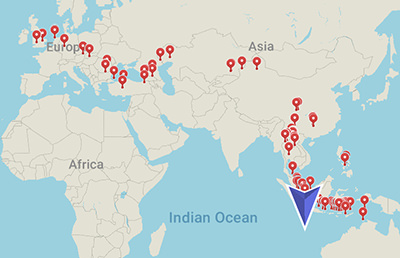
Shannon Coggins: I really like the fact that you call it ‘slow travel’. I’ve not heard that phrase before. It feels like I have heard it, but I don’t use it. And yet, it’s exactly what it is.
You’re the ambassadors of the slow travel movement!
Shannon: Let’s hope so. It used to be how everybody did it.
Another way of traveling around the world without planes is - by walking. Check out the incredible story of Tom Turcich!
Off-the-grid and on-the-road
Besides traveling off-the-beaten-path, you also live off-the-grid, don’t you?
S: Yes, we have built our own home. There was a long battle for planning permission over 20 years ago. Eventually, we won. The 4 acres of land are owned collectively by a group of 16 shareholders, of which Theo is one. We all have permission to build low-impact dwellings, with a limit in size.
Our home has three rooms, we’ve got a borehole for the water, and solar panels for the electricity. We are surrounded by trees and a garden that is full of birds. There’s a compost toilet outside. We have a shower which is in a shed. It’s a wonderful way of living. I love going outside to the toilet. I like collecting my water from the borehole. You have to interact with nature to do those things.
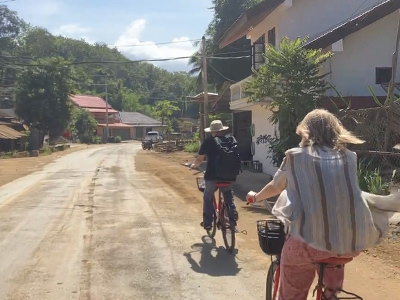
We’ve got a car park in common, at the bottom of the hill. Everybody parks there, and then walks to their houses with wheelbarrows, with all their stuff. It means it’s really safe place for children. They can run around, they’re going to see each other and have some agency about friendship and playing. It doesn’t all have to be organized by the parents. It’s been great.
It’s hard in winter when the power goes out. You have to be a lot more thoughtful about charging your computer. I used to take mine to work every day, charge it up, and bring it back home again. That’s how we live.
Theo Simon: It’s on the edge of the big village. Our collective bought the land, it’s been very low cost. But that was because we got permission on the basis that we would live very low-impact, and that we would reestablish the wildlife corridor between both sides of that field, by planting trees and bushes, which we have done. It’s become quite bio-diverse again. We have our own electricity, water, and sewage. And we have to recycle our waste as well.
S: All our rubbish is our responsibility. No one comes to collect our rubbish.
Leaving home sweet home
Is living off-grid the way to more easily save money for traveling?
S: Choosing to live a more modest lifestyle did have an impact. You can rent a big house and not have much money. You can buy a big house and have a big mortgage, and not have much money, but you’ll have security when you’re older. Or you can live in a simple, smaller way, which is what we managed to do. But it’s not an easy option. It’s not like leaping off-grid is easy. But it has meant that we can save up some money.
Theo: Now we have a housesitter. Because we also have a cat, which is really hard to leave behind.
S: Rosa’s cat.
T: Yeah, we have a house sitter looking after it, and knowing that we will be back in June.
You must be missing your cat, Rosa! But you’ve seen many on the road, right?
Rosa: Yeah, as many as I can. My cat’s name is Tequila.
S: At the rescue center, where we got her, her mom was named Sherry. Her sister was Whiskey. And it was only fair that she was given an alcohol name.
Your housesitter is a friend or someone you found on a house-sitting / swapping site?
S: It’s a friend of one of our neighbors. In Australia, we’ve signed up for housesitting. We did a housesit for a family with five dogs, a lizard, a goat, six chickens, and fourteen parrots. We did that for ten days.
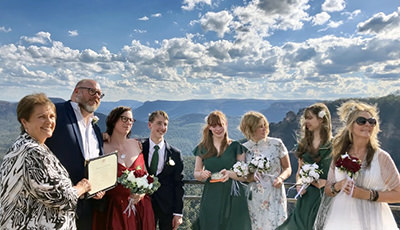
From protest to purpose
Wow, a grand zoo! But let’s get back to how you even got there. You left the European summer of 2023 behind and will be back to the Old Continent when the summer of 2024 arrives. That’s quite a long trip for attending one wedding in Australia! Most people don’t decide to slow-travel around the world for a year. How did the concern for the climate change come into your life?
T: Me and Shannon actually got together through the road protest movement in Britain. We got very involved in defending the countryside against road building, which was a successful campaign, it ended in the 1990s. We also became musicians who often played in support of campaigns. We’ve been doing that for 7-8 years, when the band had already flown to Seattle, for a little tour, supported by the Farmers Union in America. We’ve gone and supported farmers in India and done a tour there against genetically modified crops. Shannon and I have also been a part of a non-violent citizen initiative in Palestine, we’ve flown there. We were very aware of the environment and of climate change even back then.
S: I asked a friend at the Center for Alternative Technology in Wales to calculate my carbon footprint. My footprint for that one flight to India and back was half the carbon that I used that year, and it was twice as much as what I should be using if the planet’s atmosphere was gonna stabilize. And I took it on! Okay, I should be using between 1 and 2.5 tons. So what am I gonna do?
I didn’t know anyone else who wasn’t flying. Everybody would look at me like I was an idiot. It was horribleShannon Coggins
I am a very practical person, Ivan! This is my responsibility, my life is my responsibility. I was a bit of an anarchist at university. I wasn’t trash-the-state kind of anarchist, I was more – it’s about me, what am I going to do? If I can see there’s a problem, I’ve got to act. And the only thing I could think of to do was to give up flying. It was easily the biggest and worst thing I was doing.
It was so horrible. I didn’t know anyone else who wasn’t flying. Everybody was flying and they would look at me like I was an idiot. Or the ones who had some kind of awareness would confess their guilty stories of their flights here and flights there, in the hope that I would absolve them of their guilt.
It took a long time before I could get through my feelings of jealousy that all these people were flying and having wonderful holidays, and I wasn’t. It took about 4 years. Because I loved flying. I loved going off on those holidays, they were so fun. I loved getting in the airplanes, and the little meals you get, the whole thing, I just loved it! It was tough to give it up. But I did.
I got to a point where I stopped being aggrieved by anyone else’s flying, or I could just understand it. I understand why people want their holidays, why they want to visit their family. But I can still carry on trying to make my difference. I think we all have to go through a bit of a process like that when we give up something that nobody else has given up. It can be lonely for a while, but I don’t feel that anymore.
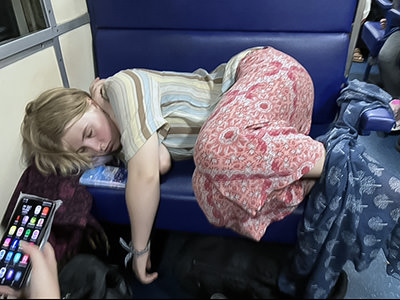
R: I’ve kind of always been aware of the climate, because I was born into where we live, and my parents are both activists. I grew up surrounded by that. But then I’ve made friends who were environmentally aware as well. I’ve seen climate change and I believe it to be true. And I’d better believe it to be true, because I’m gonna have to deal with it in my adult life, I know that. I don’t want to make it worse. I want to try to do what I can. Honestly, I did find being in a plane a bit scary anyway.
Because that flight from East Timor to Australia was your first one ever, right?
R: Yeah, I don’t want to do it again.
If you want to travel around the world with the lowest carbon footprint, why don't you sail around it? Bert terHart did just that, alone, at the age of 62!
The social dynamics of slow travel advocates
Shannon mentioned: before one finds a community that embraces the slow travel trend, people could look at you like a weirdo or an idiot. In one blog post on the Buckle Up Dorothy website, Theo mentions the risk of becoming an “unapproachable self-righteous hermit”. It seems there is a considerable stigma that people who want to reduce their carbon footprint have to live with. Did choices you made due to your different lifestyle affect how you fit in your circles?
R: Actually, I’ve never experienced negativity from it. When I tell them where I live, a lot of people find it really cool. People my age seem to like the idea of living in a low-impact dwelling with no rent, out in the woods. It’s exciting for a lot of people. Obviously, all my friends fly. I don’t have any friends that haven’t been on a plane.
We can go from England to Europe easily because of the Eurostar and ferries, it’s very straightforward as it’s a very small stretch of sea. So we go on holiday to the south of France a lot. We get the Eurostar and then we go by car all the way down and camp. But the furthest I’ve ever been before we went on this trip was north of Sweden when I was 10. We took a week and went by train all the way up. We stayed there and saw the Northern Lights.
S: We spend all our money on experiences, Ivan. We have no savings! All we’ve done is save up money and then go somewhere amazing.
T: Thinking back to when we started saying that we wouldn’t fly, it wasn’t just us. There were other people that we knew in the climate movement, who were concerned about nature. Everyone was getting to the point where they knew that flying had a big emission. You couldn’t hide it. I was very uncomfortable that they still wanted to fly, or needed to fly.
People say: “I flew up to Edinburgh. Sorry, Theo.” I’m not your priest, you don’t have to apologize to me, but to the planet. It’s not me that you are hurtingTheo Simon
It was a big decision to take. But it was also partly because we were in a band that had a reasonable following. If we’re singing those things… Personally, for me, it wasn’t so hard, because I’m not such a great traveler as Shannon, I could happily stay in my shack all the time. Well, that’s not quite true. I love traveling, but it is not something I naturally want to do. Nonetheless, we thought it would be good for us to say: “We are not flying.” It felt like it was responsible in a leadership way, just to raise that. Firstly, to help people understand that our lifestyle was part of the problem, we could all look at that. And secondly, to get us thinking about how the world needs to change, what else do we need to do? It was a big step, but it was one we thought we should take.
Shannon mentioned the absolving, and I found that particularly interesting. My friends still apologize as if it’s me they are offending. In Britain, if people have to go to Scotland, they’d fly, because it’s actually quite cheap to go to Bristol and get on the plane. Whereas if you go on the train, it’s a lot of money, and it takes a long time. So people say: “I flew up to Edinburgh. Sorry, Theo.”
I get quite angry. I’m not your priest, you don’t have to apologize to me, but to the planet. It’s not me that you are hurting. I don’t usually say that. As Shannon really captured it in that song, it’s not about criticizing other people for flying, it’s just about raising the possibility that maybe you don’t have to.
Check out the 2007 music video for the song “Flying” by Seize the Day!
Investing in experience
You made a clear diagnosis about the slow travel 16 years ago, with the song “Flying”, when you recognized it as a climate crime, but also that finances and time are the biggest obstacles. As the song says, “living is hard, and flying is easy”. Not flying is sometimes a pricier choice. You have to save up for much longer to be able to afford the slow travel experience. You have to spend more time traveling somewhere, and it costs more.
S: When I was traveling before, you fly somewhere, stay there, and fly back. You tend to go for a shorter time. With our current choice of traveling, we’ve been able to afford more. As soon as you leave Europe, accommodation, food, the traveling itself is so much cheaper than living at home.
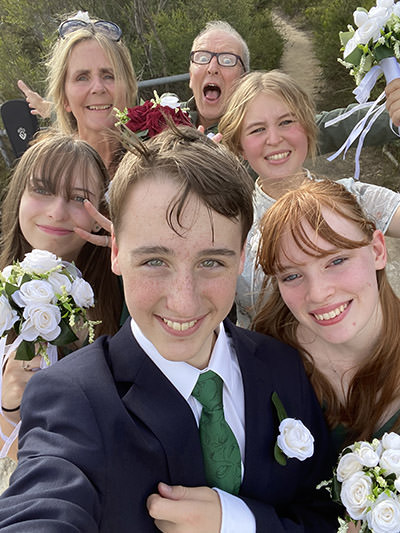
Effectively, it took us seven years to save up for this slow trip. There are a lot of things you could do with that kind of money, to deposit it, upscale solar panels… People normally redo the carpets in their houses or get a better telly. We could have gotten a really nice electric car.
But this trip is about coming to Australia and seeing my sister who emigrated 16 years ago, 4 years after I gave up flying. And the trip is about seeing the beauty of the world. When Rosa was 10, and she was just leaving the magic of childhood, I wanted her to see the Northern Lights, because that’s the magic that’s in the real world. She is just turning 20, and I wanted her to see the beauty of the real world, what is our world like.
And that’s true for me too. What is China like? What are the people in Russia like? What happens in Kazakhstan? Where is Laos? We’ve answered so many questions for ourselves. By traveling slowly through our world, we have seen so much, and so much has changed in our perception of the world. That’s worth much more to us in our lives than almost anything, it really is. My understanding of the world has changed. And I love it even more than I did before I left. It’s worth the money.
A Canadian family also took their children on a trip around the world to show them its beauty. But they had another urgent reason to do it - their kids were going blind. Read the interview with the inspiring Edith Lemay!
Voyaging against the current
You still live in a society, where you are surrounded by people who do their travels differently…
T: When we stopped flying when Rosa was born, we basically went to New Forest Camping. We did what any British family used to do all the time when I grew up, before the cheap flights came in, which was holidaying in Britain and taking a day to get there. And it was great. We discovered going to Tunisia as well, we did mad dashes on trains to Spain, to get the ferry over to Tunisia, stayed there in the off-season for a week, and then went back. So we did some quite long journeys. They took longer, and cost a little bit more probably. We could only do that because we get that 2-week holiday or whatever.
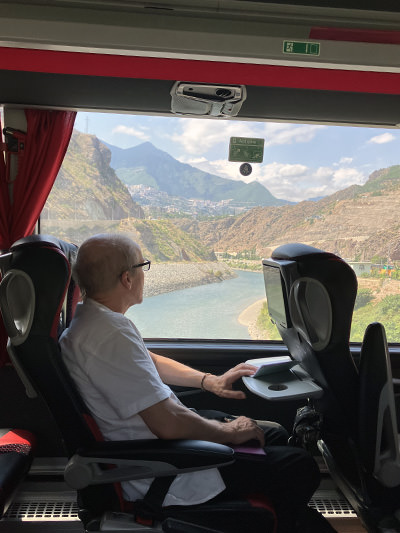
But some people pop off quite a lot, whenever they get a break, they fly off somewhere. I completely understand why they are just dying to get away. There is that thing that if I can go where there is sun, and I can drink without worrying about driving, and it’s a nice-ish hotel, and there are a few sights I can go and see, that will replenish me and then I can come back to work and carry on.
I know people have great experiences, I’m not dissing them. But quite often, they come back moaning about the food, or something about the hotel. I don’t feel that they had that much of a different experience. They’ve gone to places that are very far away, they’ve taken long flights to get there, and they sound exotic, but I feel that they didn’t necessarily need to do that. They probably could have gone to the Centre Parcs and had as good an experience without flying. So that’s how I feel about those holidays, I’m not interested in them, whereas the traveling, when Shannon first suggested it – the way we get to see the world and see people – that interested me, especially for Rosa.
Forgiveness for flying
Shannon, how do you look at the choices of others?
S: I have a different take on this. Someone I work with is a single parent, she hasn’t been away on holiday for five years, and she saved up a little money. She bought a week-long holiday in New York, to take her daughter away on a first holiday for all this time. I’ve given her some money towards it, I wanted her to go so much. I didn’t care that she was flying. I cared about the fact that she’s had a really tough life, her daughter’s had a tough life. This was something that they thought was going to be really special, and it was. It was fantastic.
As individuals, we are not going to change anything. Yeah, the flight was going to Australia anyway. But if there’s another 100 families we meet on the way, that’s one less plane 747. Slow travel is a real thing!Shannon Coggins
You know, if my sister ever needed me in Australia, I’d get on a plane like a shot. When my gran was dying in America, I rang her up, and said: “Well, do you want me to come over now, before you die, do you want me to come to the funeral, or shall I give your daughter, my aunt, the money for the airfare?” And she said: “Oh do that, love, don’t bother.” But I would’ve gone if she wanted me to.
As individuals, we are not going to change anything. This journey of three of us traveling overland to Australia – so what? It’s changed things for us. Flying is only 8% of global emissions anyway! There are an awful lot of other things to do. It’s just if we’re going to go to Australia, let’s try and do something different. Let’s open up the possibility, let’s not have a go at anyone else for what they do and how they live their lives. This is about the choices we are making. Is it possible? Can we start thinking about doing things a bit differently? That’s all I want, really.
Yeah, the flight was going anyway. Of course, it was. But if there’s another 100 families we meet on the way, that’s one less plane 747. We met three families! Slow travel is a real thing, Ivan!
No-fly tribe
T: Really interesting for us was finding different people who were doing part of the journey when they could go by plane. There was another no-flight family, doing the exact same thing, we met them in a cafe in a little town in Indonesia. We met a young dude from Prague, who was traveling around with a camera doing no-flight.
While we were away, there was this whole story of a climate scientist Gianluca Grimalda who was working in Papua New Guinea, and he was asked by his employer, the Kiel Institute for World Economy, to come back to Germany for a business meeting. And he said: “Okay, but it will take me two weeks, cause I can’t fly. I’m a climate scientist, and I know what this means, so I’m not gonna fly.” And they said: “You are sacked! You’ve gotta come back!” He said: “I’m not. I’m coming the slow way.” So he’s now back in Germany, but he did it the slow way.
Like us, all of them found that there was a point in their journey where they had to fly. We’re now trying to figure out if we can get back without doing that. But we will see. And Shannon said: “If we can’t, we will fly.” We will if we have to.
Navigating the emotional turbulence
Still, getting on that plane in East Timor must have crushed you!
S: Getting on the plane did break my heart, Ivan! Rosa’s attitude to it was the most sensible. When we got to Australia, she tried to get me to notice that we’d actually made it. I was all: “No, we failed, it’s so bad, I’m so depressed.”
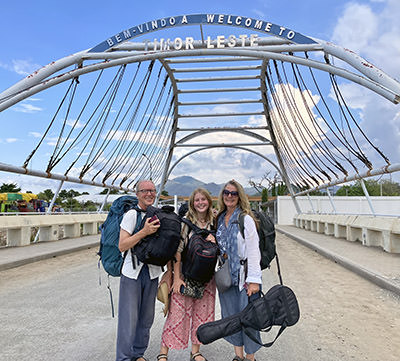
R: It was hard even for me, I felt guilty about it. I also felt kind of defeated; we’d come all this way without flying at all, we got almost halfway across the world without getting on a single plane! Most people we’ve met up to that point had to fly at least once just to get to where we were. I was so proud of us actually.
In East Timor, we tried really hard to find a way to get over by boat. But it was the wrong time of the year, the wrong season, so we couldn’t. And we had to get on that little plane. But it was such a fraction of our journey. Even despite that little flight, our carbon emissions were significantly lower than if we had taken a plane all the way.
T: I felt a bit depressed about it. In one way, we didn’t travel slowly enough. We were on the move quite a lot. And when we were not on the move, we were trying to plan our next move. Because you can’t plan it all over the internet, not yet, maybe never. So we didn’t know if there was gonna be a bus from Almaty, and then we got Covid, and then we had to try and find the bus. Wherever we were, there was often some work to be done.
It can be quite tiring, just being away from home. We are older people too. It’s not like we are young travelers, forming relationships. It’s physically slightly challenging, it was very, very hot. We’ve been in Indonesia a long time, and we tried and tried, and it built up to this, but we couldn’t do it.
We had that close call at the end when we thought it looked like, by some mad miracle, we were gonna get a boat. And then we took that to the wire, the owner said ‘no’, and there we were.
I went through thinking that this invalidates everything we’ve done, and then thought we should have stayed, even if it meant staying for months until we got the boat because of the carbon. It was a very exaggerated emotional feeling, to be honest. Because once we’ve flown, I felt like, well, that wasn’t such a big deal. (laughter) Then I remembered that everyone else flies all the time.
Finding solace in carbon calculations
What did you do to get yourself back up, Shannon?
S: It messed with my brain, Ivan, as I was sitting there, getting completely depressed. I’ve arrived in Australia, our ultimate goal, we’ve made it. In four months, we got through Russia, we got through China, things we thought were impossible. Here we are, how amazing, we are still in one piece, we didn’t lose any limbs, we didn’t have any major illnesses other than Covid, and I am depressed.
I woke up very early, feeling like a criminal, and sat there on my phone, and did our carbon footprint. I found some really good websites, it was very thorough. And because we’re not using our car at home, and we’re not using gas in our cooker, we’ve actually used less emissions, even if we would have stayed at home, which is remarkable. Driving our cars to work, day to day, having to get to the supermarket, all of that’s gone out of the window because we were doing everything by public transport.
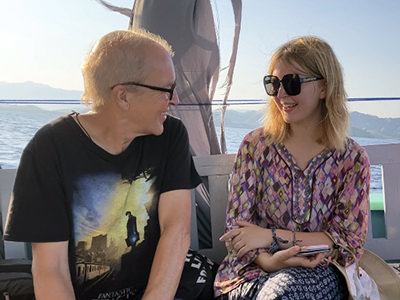
We nearly got on a cruise ship from Bali to Cairns. Obviously, it’s not flying, and then we could have felt like we’ve “done it”, we’ve actually made it, we didn’t fly. But the carbon footprint of that cruise ship was through the roof compared to our little flight from Dili to Darwin.
We were going to try and find a propeller plane. But we stayed with an honorary British consul in Dili, and she said: “Yes, but Qantas jet is going anyway, every single day. So you’d be adding a propeller plane. You would definitely be adding more carbon.” And she was right. I mean, if I got on a boat and the plane is going anyway, alright. But if I’m chartering a propeller plane to take me where I want to go, and there is a plane that is going there already, that’s not okay. I had to suck it up. Didn’t want it, but I did.
Social media backlash
The feeling that one’s action is somewhat insignificant is what sometimes stops people from acting at all. Planes are flying anyway, they could indeed think. Of course, you’re talking about the sum of our actions that makes a change. Is there a solution to that?
T: That’s really interesting. Some compensation for feelings of disappointment was that we suddenly got all this unexpected media interest for the story, from the British and Australian press. It also showed that the whole idea of low-carbon travel was something that people were now more interested in. It wasn’t so cranky.
But one of the things I noticed was, as soon as it came out on social media, there were a lot of people who just wanted to have a go. That’s what people do on social media. And so they were piling in, saying: “What numpties! The plane was going anyway, they could have just got on a plane, they’ve made no difference.”
Of course, you make a small difference if you don’t add the weight to the journey anyway. But that’s never been for any of us a key thing. It wasn’t a boycott to stop the plane from flying. But the fact is that the more people think ‘maybe I don’t need to fly’, then the less demand there is. The less likely it is that an airport’s gonna build another runway. The less likely it is that an air fleet is gonna get expanded. The more possibility there is that some enterprising person would develop a good sea route for passengers between Australia and Timor because there is a demand.
So it’s a small thing but, we’ve seen it with other green lifestyle ideas, that could suddenly change quite quickly, once people get into it. Flying to places is an idea that’s been sold to us, that this is just something we want to do and need to do.
One of the great and quite humbling things about traveling is speaking to a worker on our train in Romania or an oil worker on a Kazakhstan train. These people – they’re not gonna jump on a plane! Most of the world’s population is not in a position to think about jumping on a plane or not jumping on a plane, about what it is like to sacrifice a holiday in the Maldives. They never have that opportunity.
I don’t think it’s central that we fly as much as we think we need to do. We might change our society to make it good in other ways. Or we might develop slow travel, we might develop airships. We contribute towards that change by making that decision.
Beyond just being about carbon, slow travel is a much more interesting way to get around. If you’re gonna take a gap year, why fly somewhere if you can travel overland?Rosa
Slow travel, big impact
S: What do you think, Rosa, when people say you didn’t make a difference, what’s the point?
R: Well, it brings into conversations the idea that this is a possibility. And especially for young people, people my age, if they are gonna take a gap year, why fly somewhere if you can travel overland? That’s exciting, that’s an adventure, that’s more impactful than just flying somewhere. You get to see it all, you get to experience things you wouldn’t have experienced. You would just fly out of these countries, and you wouldn’t even think about them. But now you have to think about them because you are getting through them. And you might find a country that you really love by accident. So beyond just being about carbon, it’s a much more interesting way to travel. You see more of the world, and you get more of a sense of the world as a whole union. We’re all living on the same Earth, and that’s so apparent when you travel through it.
S: Slow travel is a wonderful way of travel. So maybe they are right. Maybe the plane is going anyway, maybe we are numpties, maybe we should have got on a plane. But having done the journey, I’m glad we did it. I saw and learned and changed more. I want to live in a world where people are trying to take care of the climate. And they may not get it right. I may not get it right. There may be something I could have done that was better, different, more. But this is me making an effort. I applaud myself and I applaud other people who are trying to make an effort. Collectively, we keep coming up with good ideas on how to do it.
T: The lifestyle hopefully has effects, but it’s for your own benefit as well. It’s about not being defeated by things. Like, we want to travel, but we don’t want to fly. Can we do that? Then, it’s challenging. But we’ve found out that it wasn’t as challenging as we thought it would be. It was actually easier in some ways. Then you get resilience, and it helps your optimism. If you make those choices yourself, you don’t feel so defeated by the situation, and it can make you feel more positive. It’s not impossible for me to go to China, I don’t have to fly, I can still go to China if I want to. And that’s been good for us.
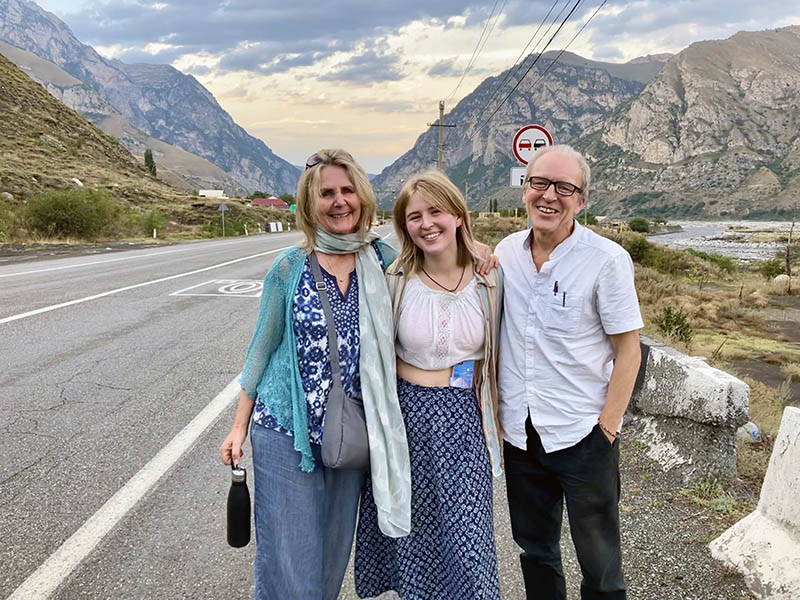
Surprises beyond the Yellow Brick Road
To share the benefits of slow travel with the world, you launched the Buckle Up Dorothy blog. Besides an obvious connection to the “The Wizard of Oz”, as Oz was where you headed, the phrase you chose for your site’s name is a strong reference in pop culture, announcing big and unexpected events. What were those for you on this trip?
R: It was all big and unexpected in a way. Nowhere was as we expected it to be, not really. That’s the thing about travel, you get a sense of a country from a distance, but it’s impossible to know what it will be like until you are there. I’ve been surprised by so many places, positively and negatively. I was really pleasantly surprised by Turkey. They have loads of cats, they are all really well taken care of, and really friendly. They live out on the streets, but everyone respects them, vaccinates them, and feeds them. It’s really lovely, I haven’t seen that before.
S: It’s a whole culture, taking care of cats, amazing.
R: We were really excited about Kazakhstan because we had no idea what the country’s gonna be like. And it turned out the country is almost entirely a flat, featureless scrubland.
T: And an environmental disaster.
R: The people were nice. We stayed in Almaty, which was really nice, and near the mountains.
S: Tbilisi, in Georgia, we had thought it’s a cultural hotch-potch. It’s a very mixed experience, very European, but still has Russian influence. We were expecting a very open and interesting country. The hostel we stayed in was a melting pot of different cultures and ideas. But the people out on the streets didn’t look happy. The older generation looked like they were still part of Russia, and they were depressed. The younger generation all wanted to be a part of Europe, and they would get depressed. You know, how can you make such sweep judgments when you’re there for a week? But we didn’t get that feeling in almost any other country. Turkey had its own identity, Russia, China… Most of these countries we traveled through knew how to be themselves. And Georgia felt like it was almost subsumed by other cultures and other ideas. I can imagine there are quite a few countries that are like that, and how hard that is for those countries that have had that influence from so many different places.
T: It’s very personal. We’ve met somebody else who’s been to Georgia, and they’ve been to the mountains, and it was great. You can’t obviously rely on a traveler to tell you what the country is like. We had a really limited experience.
From tourist traps to true encounters
How did you feel being a traveler in the world of tourists?
T: When we went to Indonesia, we had some very ordinary experiences. On the ferry to Jakarta, Shannon met someone who invited us to her cousin’s wedding. A full-blown Muslim wedding! And we sang there, really fantastic. Then we went to Bali, which is where most of our friends would know in Indonesia, and actually went to Ubud, a beautiful little town there. But the town is now designed to find ways to extract as much money as possible from Western tourists. Which is completely understandable. But it means that it wasn’t a place where we felt we could be ourselves.
S: We’ve got friends who went there quite recently, and absolutely loved it. They recommended it to us. And the people that we met doing the selling, we really liked them. It just wasn’t what I wanted from my experience of being in Bali. What I did get was an open cremation, an incredible experience, and the community, because they all paid for the coffin and the ceremony, that was incredible. So they are running alongside each other in Bali. I think that’s what people notice from the place. Bali is still Bali, and they worked out how to make a lot of money from the people who come there.
I did not have much of that experience. The places we traveled through were much more where people live, and we got used to that. We haven’t spent much time on the normal tourist trail, so it was a culture shock ending up somewhere where our job was to pay for things and buy stuff, and we weren’t doing that. It was kind of difficult.
T: In Laos, which had a much lower tourist footprint going on, and it was off-season, we had a really pleasant experience of being in a tropical place, but not feeling that we were the target of everyone, that our job was to supply the money.
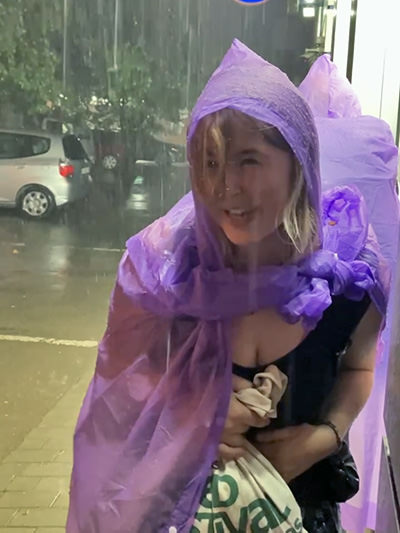
Then we had a few negative experiences like finding ourselves in a flood in Tbilisi before we knew where we were staying for the night. So we had to walk through a flood, and we didn’t know how bad it was gonna get. It was quite freaky. And we had the interrogation leaving Russia, not knowing where that would lead, but none of these things turned out to be that bad. We haven’t had a difficult time.
Pollution and progress in exotic locales
Having in mind your sensitivity toward the environment, were you surprised by the level of pollution that doesn’t usually end up on everyone’s Instagram feeds when they report from such exotic places?
S: In China, in places such as Chengdu and Guilin, the majority of the vehicles were electric.
R: In Guilin, surrounded by very typical Chinese mountains, most people get around on electric mopeds. I was struck by that because there is nothing quite like that anywhere in Europe.
S: And there was no litter on the streets. Because they have a policy where nearly everyone has a job, and people are paid to pick up litter from the streets. I got a good sense of what China is doing well.
In Indonesia, we saw piles and piles of rubbish. When I used to fly, when I went to India, I would see much more pollution, than I saw on this trip. It hasn’t been a big part of my experience. I didn’t think about what we are doing to this world. I’ve seen much more of the beauty, the kindness, and the ordinariness of people living their lives.
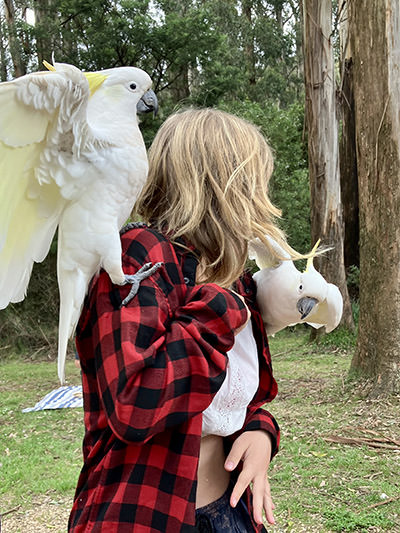
R: Most of the places have not been heavily polluted. The most heavily polluted was Jakarta, it was so obvious, wow. There’s smog in the air.
T: In Indonesia, a lot of the pollution comes from Western consumable stuff. It comes in and produces a lot of packaging and rubbish. And that has to be dealt with, same in Timor. Kazakhstan is an environmental disaster area. The first place we stayed in was an Airbnb in a grotty apartment block, and I turned on the tap and the water that came out was brown. The people in that city were living with toxic water.
So often, in places, it’s more been a measure of poverty, or a measure of infrastructure not having been developed. A few places have a problem with rubbish, they have no proper way of dealing with that, and maybe they have a problem with water.
But in most places we went, we found things which we could learn from. It isn’t the case that the Western world is way more advanced than the rest of the world. There’s an economic difference, but in different countries, things were done amazingly well and thoughtfully. And China was an eye-opener, after all the bad news we heard about it. After this, I have maximum respect for China.
Avatars of adventure – unleashing the Lion
Coming back to your blog, you playfully adopted Oz characters accompanying Dorothy on her adventure of finding her way home. Shannon took the avatar of Scarecrow, Theo embraced Tin Man’s armor, and Rosa jumped into Lion’s suit. Did you find brains, heart, and courage on the road, and in which moments?
R: For me, as the Lion, I definitely feel more courageous now than I was when I started. I found it hard and confronting to talk to people, especially strangers, to ask for help. And I still find it very awkward. In a lot of these countries, I can’t speak their language, and I’m just assuming that they can speak English, and that makes me feel uncomfortable. I feel like I should be trying to make an effort to learn their language. And I feel bad for making them stumble through English because I don’t know their language. I know a little bit of Mandarin, so in China, I was really struck, because I can struggle to ask a simple question in Mandarin. Suddenly I would be: back in England, why would I be afraid to ask that question? Because I can speak the language, there’s nothing stopping me! I think it helped me, now in Australia, to be more confident. Because I can communicate. So why don’t I communicate?
S: And you got a job!
R: Yeah, we’ve been here only for a week, and I got a working visa for Australia, so I could earn some money while I was here. And I walked into a Subway, gave my resume, and they offered me to come for a trial shift the next day.
S: Someone has to pay for our trip back, Ivan! (laughter)
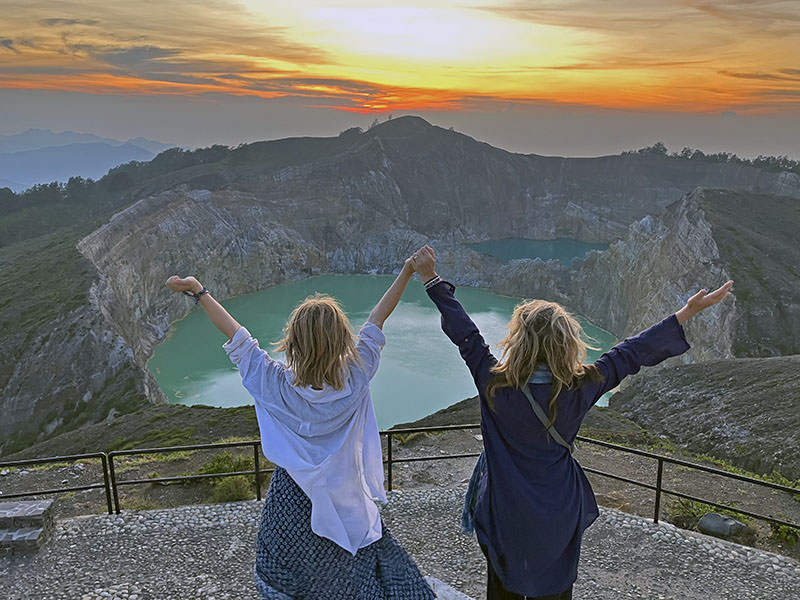
Scarecrow’s path from doubt to dialogue
What about the Scarecrow?
S: Working-class families in Britain don’t have particularly high expectations for their children. That’s not true across the board, but there’s a certain truth in saying that my Dad told me I was stupid a lot when I was growing up. And somewhere I believed him. We didn’t sit around the dinner table, discussing art and culture and museums and books, we didn’t talk much at all. Anyway, I didn’t have that kind of upbringing.
When I was growing up, my Dad told me I was stupid a lot. And somewhere I believed him. This slow trip to Australia restored the belief that my voice countsShannon Coggins
Sometimes, when I want my mind to work and I want to be able to think and say what I think, I stumble over my words. I can’t find them. I don’t know how to think in a straight line if you like. And then, I wanted not so much to challenge myself, but to believe in myself a little bit more, that my voice counts, and that what I’m thinking and what I’ve got to say – matters.
So I built our website, from watching a video. It took a lot of effort, and Rosa helped me a bit. Oh my god, it was hard work building that bloody thing! It’s a drop in the ocean for most people, but I was determined to do it. And then I have written a lot of blog posts, and that’s been my effort, my voice, and challenge to my mind.
When we did a talk in China about our journey over the Silk Road, that was another opportunity, and the press interest in us, and this, with you, you are asking me what I think, and I am telling you what I think.
Tin Man’s journey of humility
What happened to the Tin Man?
T: I was used to thinking, talking, communicating, campaigning, blah-blah, having lots of opinions. When you’re going through so many countries in succession, there’s no way that you’re gonna know other languages, so you are subject to other people, you rely on their kindness to you. I just feel quite humbled by what people are like around the world. I feel humbled to realize that a lot of what I thought I knew, a lot of my book learning, and internet learning about what countries and people were like have been turned overhead by the experience of meeting some of them.
There have been lovely odd connections with people on the way, the guy in the train compartment in Kazakhstan, some people in East Timor, people you meet on the ferry, the ship’s musicians… Often a very brief encounter, but you can really sometimes feel that connection you get with someone. That person could have been my friend, a lifelong friend! But we will never see each other again. And of course, there’s a whole thing of trying to hang on to that, should we keep in touch… But that’s not the point, because the world is full of people like that.
One of the things that makes it possible for me when we’re traveling, when I feel a bit lost with the culture, things I don’t understand, or feeling homesick, is nature. And that’s true for all of us. If we can find a bit of nature where we are and connect with that, that’s different everywhere, but it is also the same everywhere. There’s something about nature for us which is fundamentally the same spirit. Of course, it’s one planet, and when you connect with that, it has its unique quality, but it’s also what touches my heart, and makes me feel at peace and safe wherever I am. I think the strength is that I am thinking a lot more about my connection with nature, and I am much less inclined to have opinions about everything, and much more inclined to listen to find out what other people think where they are. It’s been good for the Tin Man.
Thinking beyond flight
Now that you have traveled across the world, trying to do the slow traveling, you came up with this interesting proposal that someone could think about making a better sea connection between East Timor and Australia. What else could governments easily do to make our travel more sustainable?
S: Cheaper public transport. Stop subsidizing airplanes. If you make public transport affordable, then people will use it. Train travel is an amazing way to travel! You do see more, you have more time for yourself and for other people. You can look out the window and read the book. And you can sleep! That’s a simple thing.
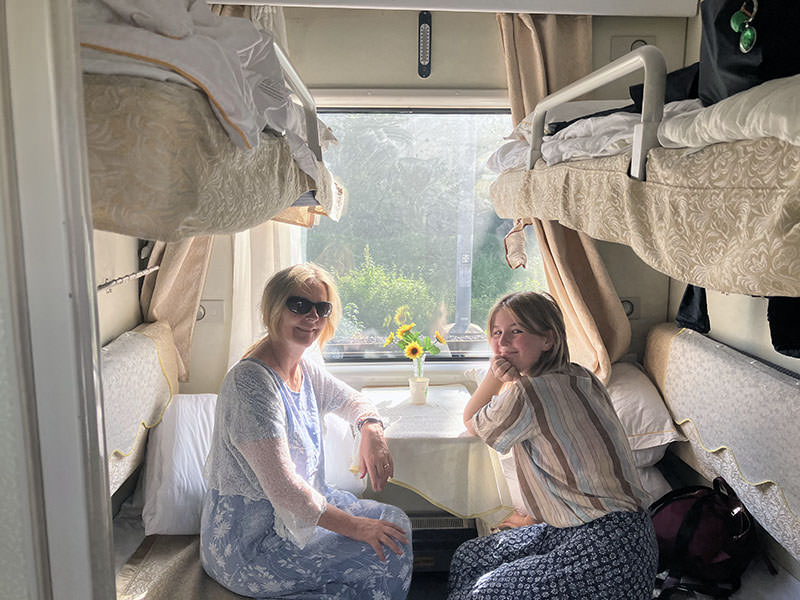
R: Some of the parts of our travel were easy once we had found the way to get across. But finding how to get across was really hard. So if a country would make that a viable and clear option as a way to travel, then the people wouldn’t fly across. Buses have often been inexpensive.
T: If governments really want to think about it, there’s a lot of options for making deals and arrangements with other countries for making those through-journeys, a bit like the Interrail system, even if that one didn’t work that well. But here, in Australia, we have a pass that allows us to use Greyhound Buses for a certain period. Rather than paying by distance, it’s the period. We know that later we can travel up the coast because it’s easy.
Do we want millions of people going to the last beautiful places on the planet? It has a big impact, so I don’t know about thatTheo Simon
You can make all kinds of international arrangements to facilitate that ease of transport, and then it’s about encouraging it. Persuading governments and particularly tourism people to see the benefit. I think we’re at the beginning of that. We had some of that discussion in East Timor, which is a pretty much new country. If you develop this eco-tourism approach, which has to include travel, otherwise it’s a bit of a contradiction, then there’s a possibility you get something sustainable which has the advantage that it won’t be destroying what’s left of your environment. It will actually be enhancing the environment, because that becomes the thing that you are selling, so you want to make it clean, you want to protect it.
There’s been a contradiction in all of it, which is – do we want millions of people going to the last beautiful places on the planet? It has a big impact, so I don’t know about that.
I think someone needs to develop airships! Because they’d be slow, they could carry freight and they could carry people.
There is another aspect about the whole thing about the slow: we’re lucky, we create time for ourselves. Most people can’t. So the other aspect would be that we design our working world to give people the time to travel and that we allow that. But that would probably involve major changes in the way we run capitalism.
UN's climate summits are when the political heads gather to reflect on the ways to save us all. That doesn't always work. Read about the COP28 hypocrisy, a great gathering of private jets in Dubai!
Tips for successful slow travel
For families that are considering doing something similar, what are the best places and countries for long-term slow travel? What is your top advice – how to slow travel? Or how not to?
S: I’d say, Turkey is well-designed for slow travel. But you have to understand the Turkish railway system, which we didn’t. So either you have to turn up and be willing to wait, because it’s very popular, or you could get your head around the Turkish website in advance.
China is incredible, it has phenomenal train systems. Every single train that we got on left to the minute it was going to, and arrived at the minute it was going to. You can travel, you can afford it. But even in Thailand.
The only place where I wouldn’t travel by train is Java because it was incredibly expensive, it was crazy money to travel there, but we went third class, and that was alright.
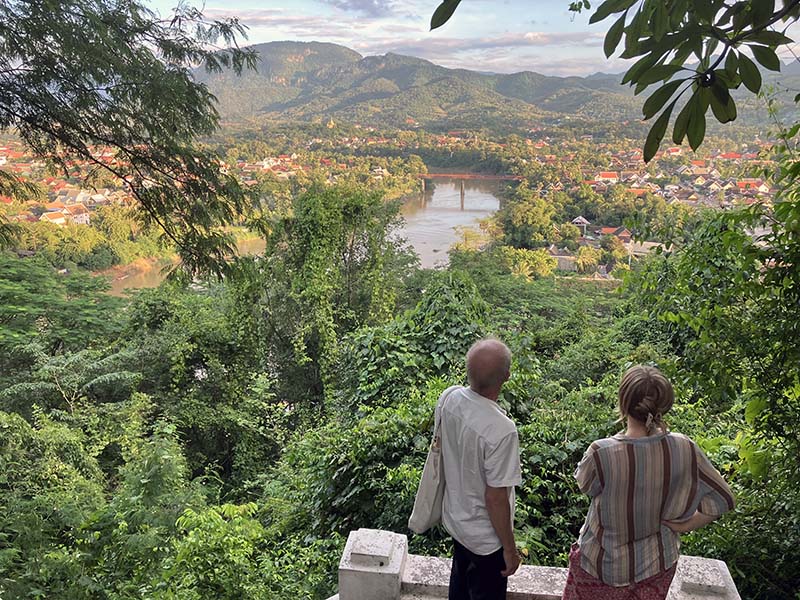
R: I think the best advice for traveling the way we do is: you should always arrive at the station an hour before your bus or train is due to leave. That has saved us a few times. Because sometimes it’s earlier, or sometimes it’s really complicated to get onto the station, sometimes you have to put your luggage through a scanner, or things get lost in translation, and you can’t understand where you’re meant to go. And that extra hour becomes a life-saver.
S: We’ve given ourselves two or three hours on many occasions.
T: For this kind of journey, you plan as well as you can. The internet is your friend, except that now often the information is out of date. You then have to arrive and try and find out what is the real information based on the information you’ve already got, and you then need to act as if even that information possibly isn’t correct. So you are covered.
The visa hustle
T: The other thing you have to do, if you have a timescale for when you want the journey to end, you have to pin down the absolutely essential bits so that you make sure to get to that bit. We knew we had to be in Russia on a certain day, we had to leave it on a certain day because that’s what our visa said. So you’ve got to structure your trip around that.
Did you plan your visas in the UK?
S: The only two visas we had to get before we left were Russia and China. You cannot get them outside of your country of origin. All the other visas we either got as we were heading to a country, online, or at the border. But China and Russia were a lot of work, and cost a lot of money.
These are then the ones you had to plan out, you had to know where you would stay, when you would enter, and when you would exit the country. How did you prove your onward travel?
S: For China, we had to buy a plane ticket. And then we canceled it after we got our visa. It cost us 300 pounds to do that. You wouldn’t have to do that anymore. You can get a train into China right now, but none of the land borders were open when we set off. To get the visa, we had to prove we had a flight.
For Russia, we went through an incredibly complicated process to get the proof of travel within Russia. But someone said that when you book a hotel in Russia, you can ask them to book your bus tickets and then pay them because they have a direct way of receiving money you pay through Booking.com or whatever. You can’t pay for things in Russia with credit cards from outside of Russia because of all the sanctions. So there are little tiny details that you learn as you go.
Breaking through climate alibis
We spoke about how the feeling of the insignificance of an action demotivates individuals from doing their responsible part. In a world where everyone contributes to climate change, dispersing the responsibility, how to deal with these alibis for inaction calling out the hypocrisy of those who try to do their own little steps?
The guy from the Center for Alternative Technology told me that climate change is the thing that we need to almost not talk about. Live somewhere, and have a good quality of life. You’ve chosen to travel overland (because why wouldn’t you?), and that has an impact on your carbon footprint. But you’re doing it for economic reasons, and it’s a smart lifestyle choice, it’s an interesting choice, it’s a social choice. And the carbon footprint almost slides underneath.
That’s what happens with this story for us. We are a family from Somerset. We’ve traveled for a wedding, we’ve traveled overland, how interesting, we’ve gone all the way from Castle Cary to Sydney, isn’t that a long way, and how amazing, they made it. And, by the way, they are worried about the climate, cause aren’t we all? That’s what I wanted because it’s everybody’s planet.
What do you think about the art of slow travel? Are you a slow nomad yourself?
Share your thoughts in the comments, and pin this article for later!
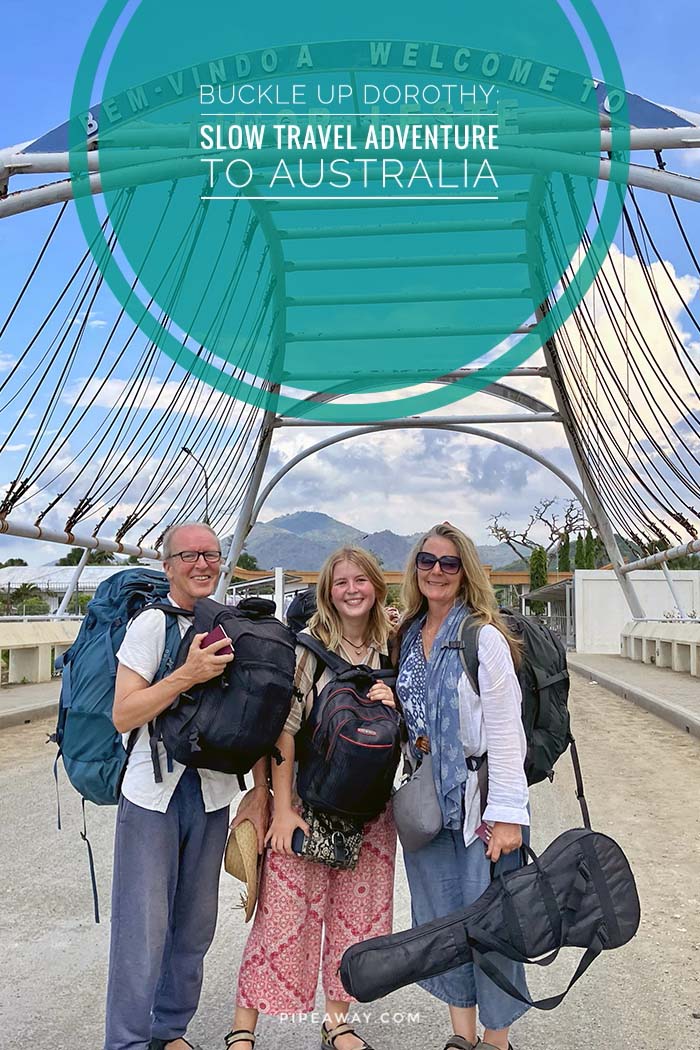
Disclosure: This post may contain affiliate links, meaning if you click on them and make a purchase, Pipeaway may make a small commission, at no additional cost to you. Thank you for supporting our work!

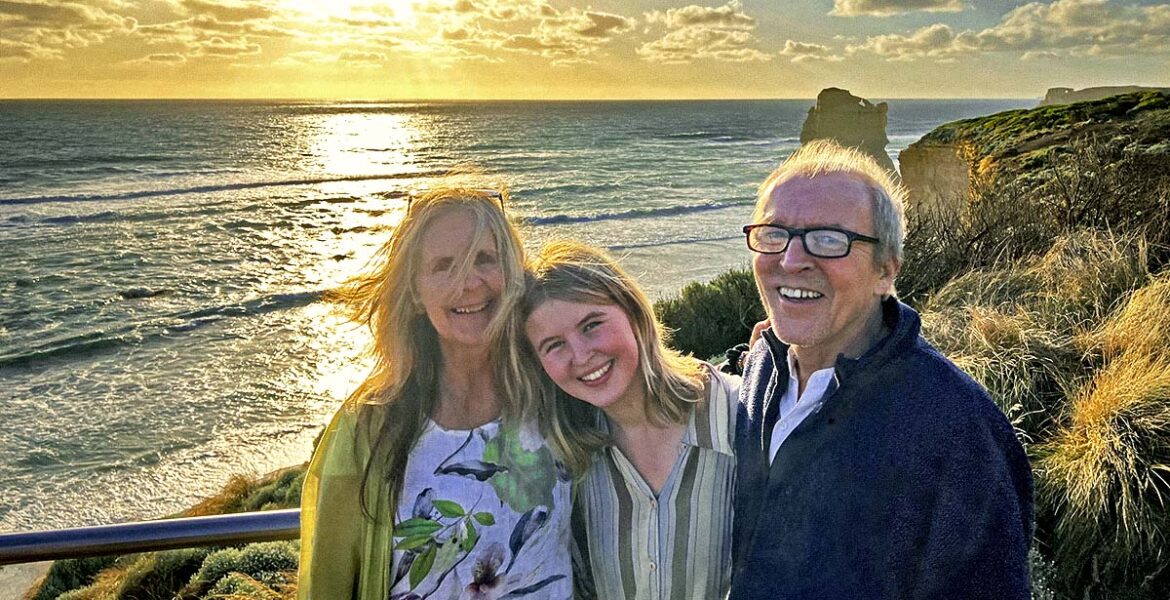

What a fun article about such an important topic. I loved their advice on different countries that are best for train travel as well.
Thank you, Alexa!
I’m glad you enjoyed the interview.
Train travel can indeed be a fantastic way to explore different countries while minimizing one’s carbon footprint.
Views from the plane window are nice, but views from the train window last longer!